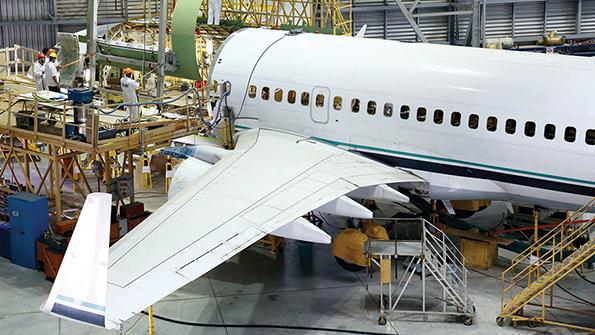
A yearlong political crisis that has paralyzed policymaking and procurement decisions seems to have bypassed Israel’s aerospace and defense industry. Instead of waiting patiently for Israeli voters to finally approve a permanent government, the industry has accelerated what company executives have called a long-overdue internal transformation.
Most recently, Israel’s defense ministry approved a proposal to allow Israel Aerospace Industries (IAI) to publicly offer a minority of shares in the company to private investors. The prime minister’s office has yet to make a final decision, but IAI’s management has never come closer to fulfilling a 20-year-old proposal for the initial public offering (IPO).
- Minority offering for IAI set to move forward
- Commercial division’s weakness has been mitigated
Moreover, two of Israel’s industry stalwarts have addressed two areas of financial weakness over the last year. In 2019, Elbit Systems consummated a six-year-old plan to acquire formerly state-owned and financially fragile Israel Military Industries (IMI), the maker of the Delilah cruise missile and other munitions. Rafael subsequently acquired Aeronautics, a previously independent manufacturer of small unmanned aircraft systems. Meanwhile, IAI has reorganized a commercial aircraft division responsible for $600 million in losses over the last decade.
The chances of further consolidation seem remote. In June, IAI Chairman Harel Locker, the prime minister’s former chief of staff, told Aviation Week that a merger with Rafael, the second-largest, state-owned defense company, was necessary and “inevitable.” By October, however, Locker had backed off those statements, telling the Israeli press there were no plans for any such move.

Joseph Gaspar, chief financial officer of Elbit Systems Credit Elbit Systems
Instead, IAI is preparing for an IPO that is expected to produce a financial windfall of about 4 billion shekels ($1.16 billion), the proceeds of which would be split between the state treasury, the defense ministry and IAI.
The partial privatization also would add momentum toward efforts to reform IAI’s business culture. The company’s commercial aircraft business traces its roots to within four years of Israel’s independence in 1948, but that segment has struggled in the last decade. Demand for IAI’s converted Boeing freighters was inconsistent, and the company failed to make a profit as a subcontractor building G280 business jets for Gulfstream. During the last year, IAI has consolidated the aircraft business from three units into a single division.
Elbit faced a similar challenge to absorb IMI, another state-owned business that operated at a loss. Still, privately owned Elbit considered IMI a good match, pairing the latter’s munitions with Elbit’s electronics. By combining both portfolios, Elbit plans to launch new and improved weapons for foreign and domestic customers.
In fact, Elbit has already won the first such contract to develop a new weapon based on IMI’s products, says Joseph Gaspar, Elbit’s executive vice president and chief financial officer.
Gaspar declined to offer further details, citing security restrictions.
“You take whatever they have done and put in a lot more electronics with more software and things like terrain-following radar, correlations and image identification,” Gaspar says. “By the way, we’re not talking now just to communicate to that missile or to that rocket. We’re talking now to communicate between several sources so that you optimize the trajectory to hit at the right place.
“We acquired a losing business, but we also paid according to the money,” Gaspar continues. “So I think it’s a good deal, both financially and from the strategic opportunities that we have today.”
Indeed, Elbit expects a “small operational profit” for IMI’s financial finish to 2019, Gaspar says, a turnaround after years of red ink.
The goal now for IMI is to enlarge the business, especially on the export market. Before the merger, about 80% of IMI’s revenues came from Israel’s defense ministry, a rarity in Israel’s export-oriented defense industry. Elbit’s relationship with IMI during 2019 opened the company’s sales prospects, leading to a significant rebalancing.
“It’s actually closer to 60/40 now. That is 40% international and 60% Israeli,” Gaspar says. “Looking into the future, I think we’ll bring them up to the [Isareli average]—maybe not 80% exports, but maybe 70%.”



